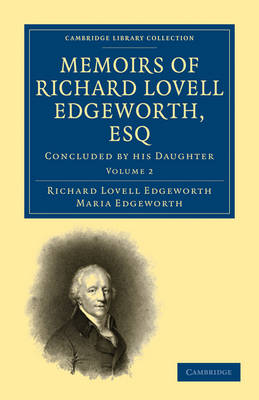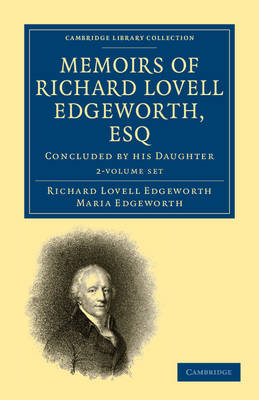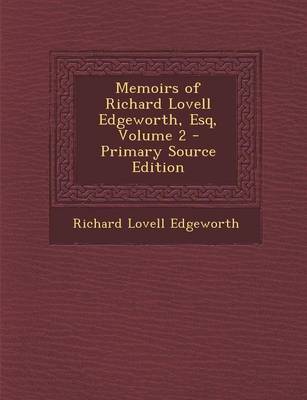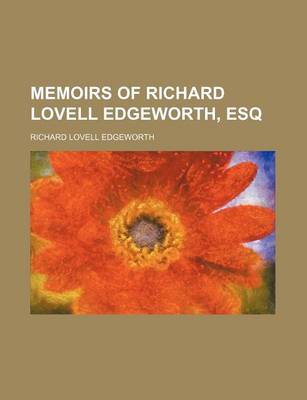Cambridge Library Collection - Technology
1 primary work • 4 total works
Volume 2
Memoirs of Richard Lovell Edgeworth, Esq
by Richard Lovell Edgeworth and Maria Edgeworth
Published 1 August 2009
Richard Lovell Edgeworth (1744-1817) was a noted Irish educationalist, engineer and inventor. This two-volume autobiography, begun in 1808, was published in 1820. Edgeworth had abandoned the project in 1809, having covered the period to 1781, and it was completed after his death by his eldest daughter, a successful novelist. Maria Edgeworth and her father had co-authored educational works, and the experience of helping her father run their estate during her teens had provided material for her novels. Volume 2 of these memoirs was wholly written by her, though it contains excerpts from Richard's correspondence. It recounts how, after his third marriage, the growing family returned to Ireland, and focused first on domestic and educational concerns. Richard became involved in Irish politics and the newly founded Royal Irish Academy but continued to publish essays on scientific and mechanical topics, as well as influential (though controversial) works on education.
Memoirs of Richard Lovell Edgeworth, Esq 2 Volume Paperback Set
by Richard Lovell Edgeworth and Maria Edgeworth
Published 24 February 2011
Richard Lovell Edgeworth (1744-1817) was a noted Irish educationalist, engineer and inventor. This two-volume autobiography, begun in 1808, was published in 1820. Edgeworth had abandoned the project in 1809, having covered the period to 1781, and it was completed after his death by his eldest daughter Maria, a successful novelist who had also co-authored educational works with him. It describes Edgeworth's eventful life, which included four marriages, twenty-two children (of whom thirteen survived him), involvement in the turbulent politics of his time, prize-winning inventions, controversial educational theories, and professional and social networks including Erasmus Darwin, other members of the Lunar Society of Birmingham, actors, writers, and not least Sir Joseph Banks, who sponsored his election to the Royal Society. The subject's personality comes across clearly in this readable and fascinating social history of a period of rapid change in Britain and Ireland.
Memoirs of Richard Lovell Edgeworth, Esq, Volume 2
by Richard Lovell Edgeworth
Published 1 January 2010
Richard Lovell Edgeworth (1744-1817) was a noted Irish educationalist, engineer and inventor. This two-volume autobiography, begun in 1808, was published in 1820. Edgeworth had abandoned the project in 1809, having covered the period to 1781, and it was completed after his death by his eldest daughter, a successful novelist. Maria Edgeworth and her father had co-authored educational works, and the experience of helping her father run their estate during her teens had provided material for her novels. Volume 2 of these memoirs was wholly written by her, though it contains excerpts from Richard's correspondence. It recounts how, after his third marriage, the growing family returned to Ireland, and focused first on domestic and educational concerns. Richard became involved in Irish politics and the newly founded Royal Irish Academy but continued to publish essays on scientific and mechanical topics, as well as influential (though controversial) works on education.
Memoirs of Richard Lovell Edgeworth, Esq (Volume 1)
by Richard Lovell Edgeworth
Published 7 October 2011
Richard Lovell Edgeworth (1744-1817) was a noted Irish educationalist, engineer and inventor. This two-volume autobiography, begun in 1808, was completed by his novelist daughter Maria, and published in 1820. Edgeworth's interest in education is evidenced by his reflections about how his childhood shaped his character and later life. Volume 1, written by Edgeworth himself and covering the period to 1781, reveals that his interest in science began early; he was shown an orrery (a moving model of the solar system) at the age of seven. As a young man, Edgeworth attended university in Dublin and Oxford, studied law, and eloped while still in his teens. He experimented with vehicle design, winning several awards, and was introduced by Erasmus Darwin to the circle of scientists, innovators and industrialists later known as the Lunar Society of Birmingham. In 1781 Sir Joseph Banks sponsored his election to the Royal Society.



